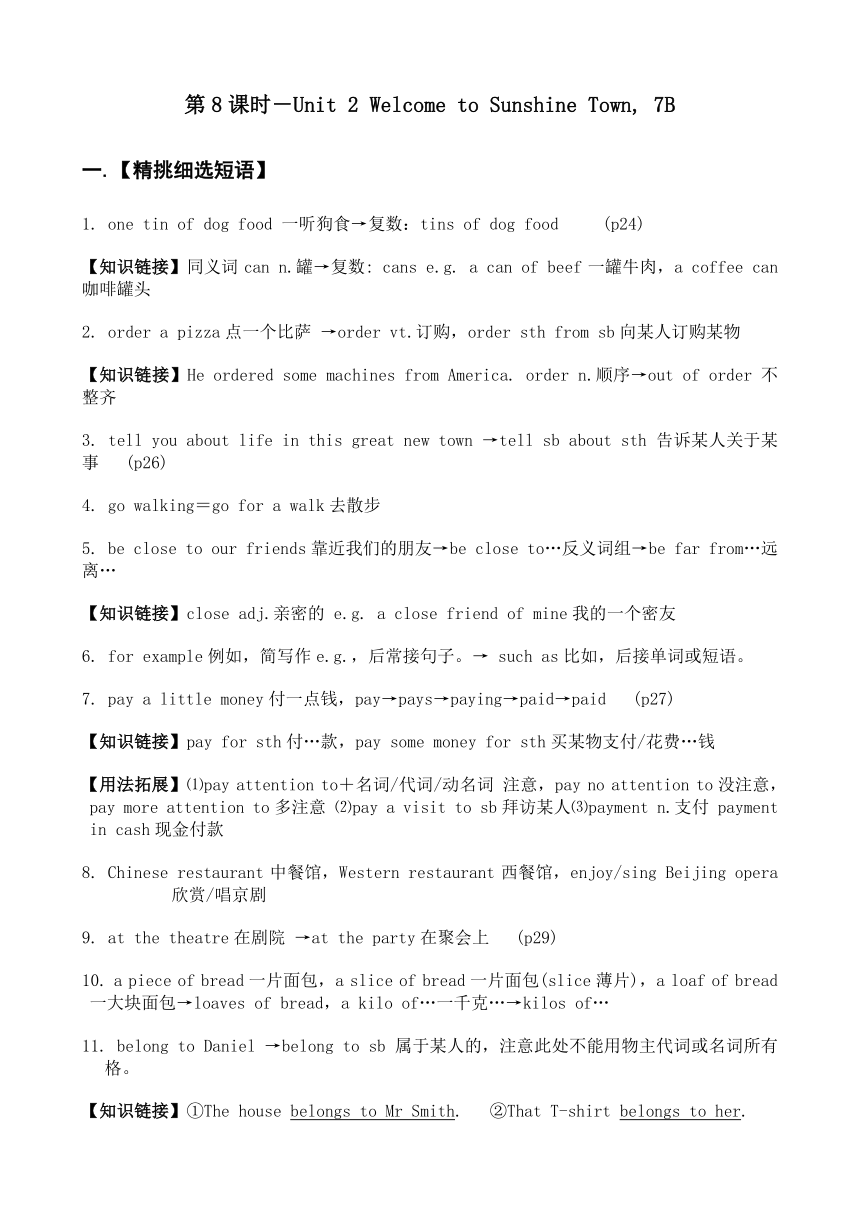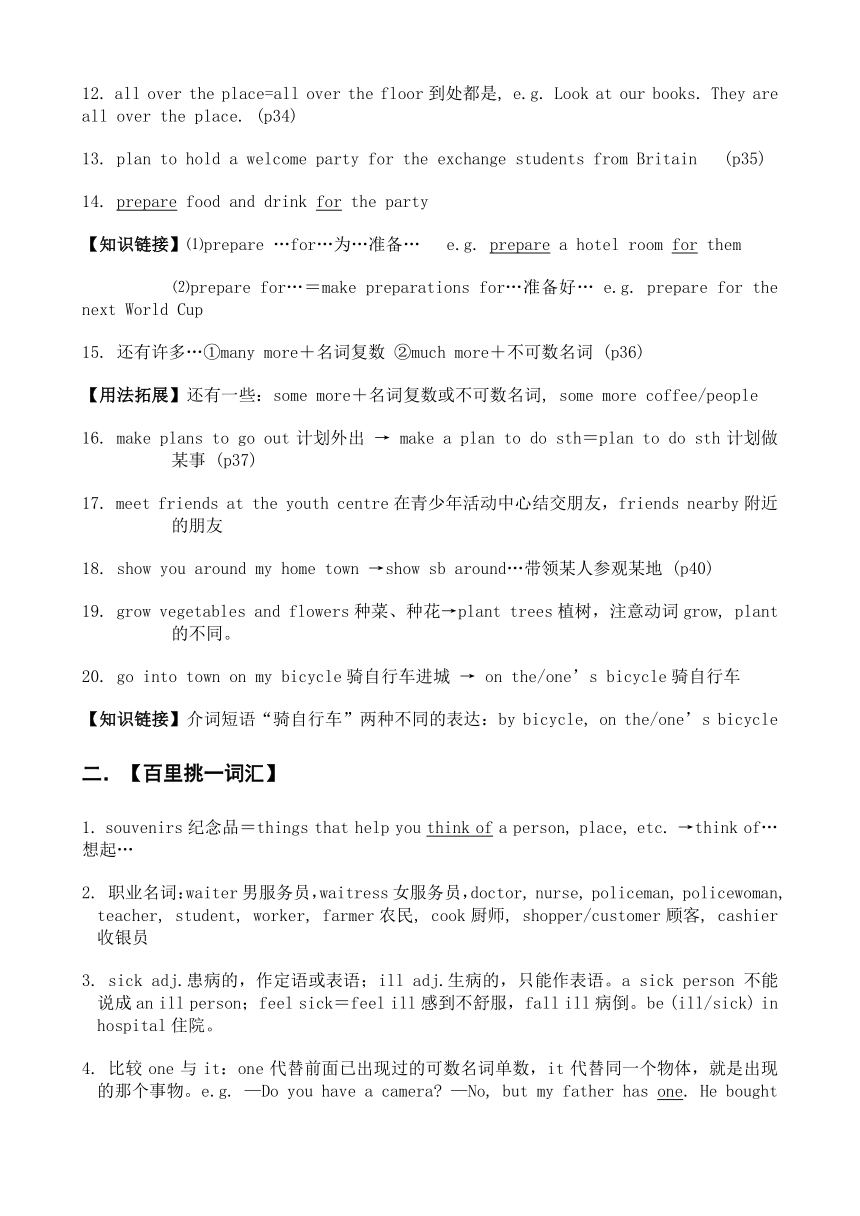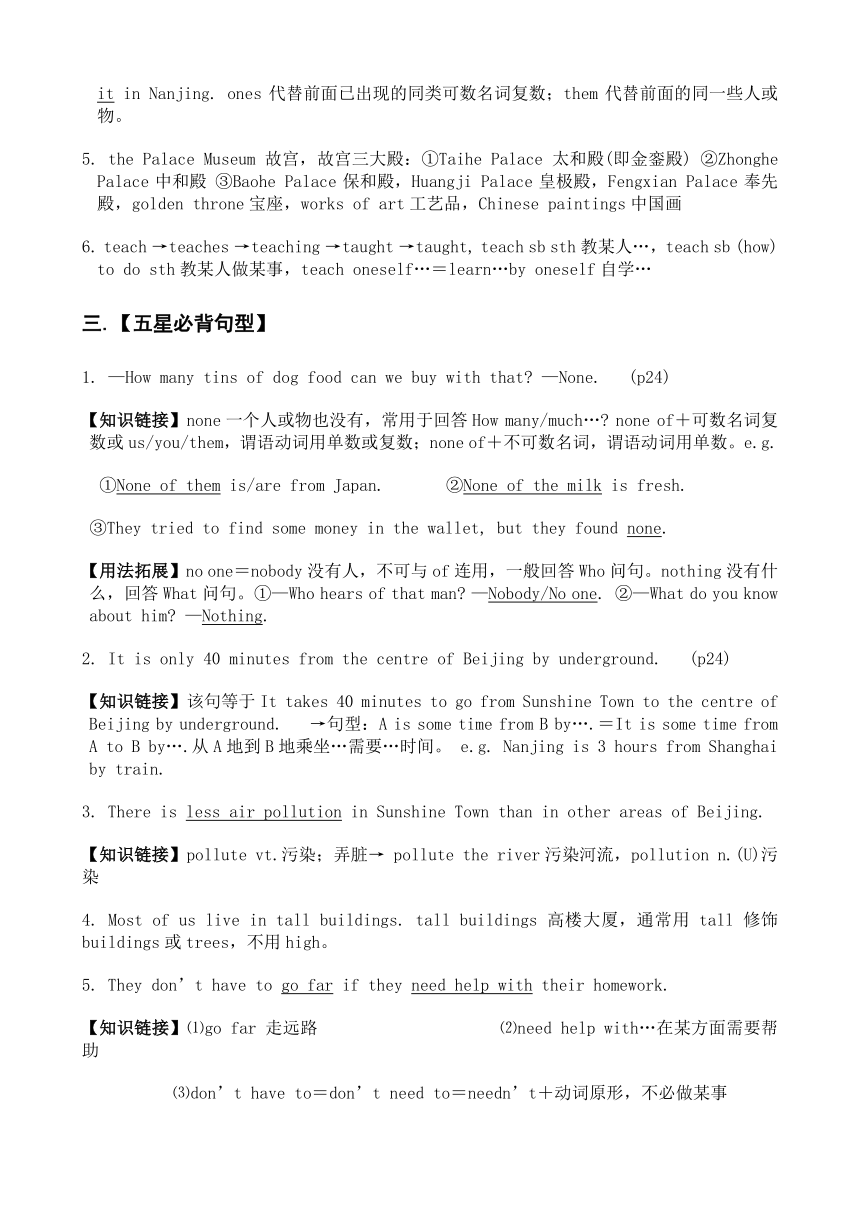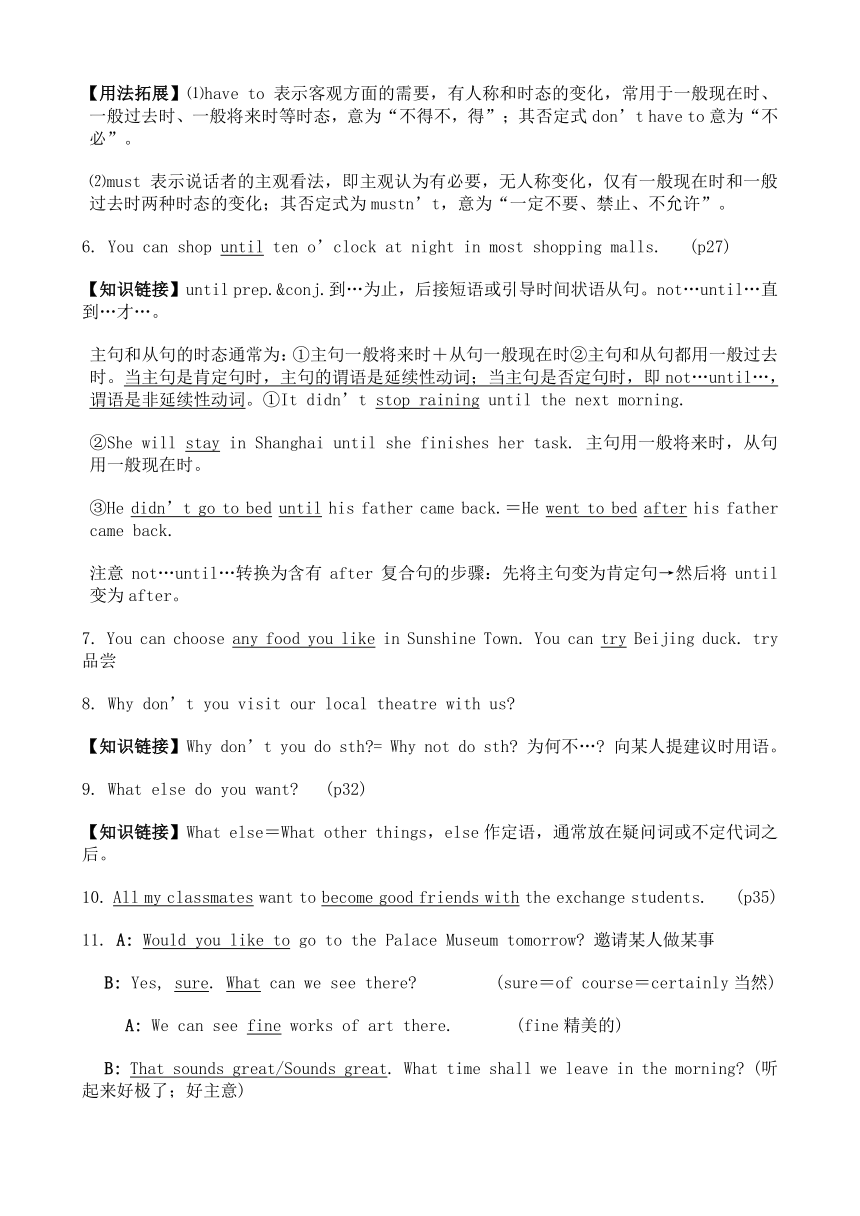中考复习资料第8课时-Unit 2 Welcome to Sunshine Town, 7B
文档属性
| 名称 | 中考复习资料第8课时-Unit 2 Welcome to Sunshine Town, 7B |

|
|
| 格式 | zip | ||
| 文件大小 | 21.8KB | ||
| 资源类型 | 教案 | ||
| 版本资源 | 通用版 | ||
| 科目 | 英语 | ||
| 更新时间 | 2012-02-22 14:49:41 | ||
图片预览




文档简介
第8课时-Unit 2 Welcome to Sunshine Town, 7B
一.【精挑细选短语】
1. one tin of dog food 一听狗食→复数:tins of dog food (p24)
【知识链接】同义词can n.罐→复数: cans e.g. a can of beef一罐牛肉,a coffee can咖啡罐头
2. order a pizza点一个比萨 →order vt.订购,order sth from sb向某人订购某物
【知识链接】He ordered some machines from America. order n.顺序→out of order不整齐
3. tell you about life in this great new town →tell sb about sth告诉某人关于某事 (p26)
4. go walking=go for a walk去散步
5. be close to our friends靠近我们的朋友→be close to…反义词组→be far from…远离…
【知识链接】close adj.亲密的 e.g. a close friend of mine我的一个密友
6. for example例如,简写作e.g.,后常接句子。→ such as比如,后接单词或短语。
7. pay a little money付一点钱,pay→pays→paying→paid→paid (p27)
【知识链接】pay for sth付…款,pay some money for sth买某物支付/花费…钱
【用法拓展】⑴pay attention to+名词/代词/动名词 注意,pay no attention to没注意,pay more attention to多注意 ⑵pay a visit to sb拜访某人⑶payment n.支付 payment in cash现金付款
8. Chinese restaurant中餐馆,Western restaurant西餐馆,enjoy/sing Beijing opera欣赏/唱京剧
9. at the theatre在剧院 →at the party在聚会上 (p29)
10. a piece of bread一片面包,a slice of bread一片面包(slice薄片),a loaf of bread 一大块面包→loaves of bread,a kilo of…一千克…→kilos of…
11. belong to Daniel →belong to sb属于某人的,注意此处不能用物主代词或名词所有格。
【知识链接】①The house belongs to Mr Smith. ②That T-shirt belongs to her.
12. all over the place=all over the floor到处都是, e.g. Look at our books. They are all over the place. (p34)
13. plan to hold a welcome party for the exchange students from Britain (p35)
14. prepare food and drink for the party
【知识链接】⑴prepare …for…为…准备… e.g. prepare a hotel room for them
⑵prepare for…=make preparations for…准备好… e.g. prepare for the next World Cup
15. 还有许多…①many more+名词复数 ②much more+不可数名词 (p36)
【用法拓展】还有一些:some more+名词复数或不可数名词, some more coffee/people
16. make plans to go out计划外出 → make a plan to do sth=plan to do sth计划做某事 (p37)
17. meet friends at the youth centre在青少年活动中心结交朋友,friends nearby附近的朋友
18. show you around my home town →show sb around…带领某人参观某地 (p40)
19. grow vegetables and flowers种菜、种花→plant trees植树,注意动词grow, plant的不同。
20. go into town on my bicycle骑自行车进城 → on the/one’s bicycle骑自行车
【知识链接】介词短语“骑自行车”两种不同的表达:by bicycle, on the/one’s bicycle
二.【百里挑一词汇】
1. souvenirs纪念品=things that help you think of a person, place, etc. →think of…想起…
2. 职业名词:waiter男服务员,waitress女服务员,doctor, nurse, policeman, policewoman, teacher, student, worker, farmer农民, cook厨师, shopper/customer顾客, cashier收银员
3. sick adj.患病的,作定语或表语;ill adj.生病的,只能作表语。a sick person不能说成an ill person;feel sick=feel ill感到不舒服,fall ill病倒。be (ill/sick) in hospital住院。
4. 比较one与it:one代替前面已出现过的可数名词单数,it代替同一个物体,就是出现的那个事物。e.g. —Do you have a camera —No, but my father has one. He bought it in Nanjing. ones代替前面已出现的同类可数名词复数;them代替前面的同一些人或物。
5. the Palace Museum故宫,故宫三大殿:①Taihe Palace太和殿(即金銮殿) ②Zhonghe Palace中和殿 ③Baohe Palace保和殿,Huangji Palace皇极殿,Fengxian Palace奉先殿,golden throne宝座,works of art工艺品,Chinese paintings中国画
6. teach →teaches →teaching →taught →taught, teach sb sth教某人…,teach sb (how) to do sth教某人做某事,teach oneself…=learn…by oneself自学…
三.【五星必背句型】
1. —How many tins of dog food can we buy with that —None. (p24)
【知识链接】none一个人或物也没有,常用于回答How many/much… none of+可数名词复数或us/you/them,谓语动词用单数或复数;none of+不可数名词,谓语动词用单数。e.g.
①None of them is/are from Japan. ②None of the milk is fresh.
③They tried to find some money in the wallet, but they found none.
【用法拓展】no one=nobody没有人,不可与of连用,一般回答Who问句。nothing没有什么,回答What问句。①—Who hears of that man —Nobody/No one. ②—What do you know about him —Nothing.
2. It is only 40 minutes from the centre of Beijing by underground. (p24)
【知识链接】该句等于It takes 40 minutes to go from Sunshine Town to the centre of Beijing by underground. →句型:A is some time from B by….=It is some time from A to B by….从A地到B地乘坐…需要…时间。 e.g. Nanjing is 3 hours from Shanghai by train.
3. There is less air pollution in Sunshine Town than in other areas of Beijing.
【知识链接】pollute vt.污染;弄脏→ pollute the river污染河流,pollution n.(U)污染
4. Most of us live in tall buildings. tall buildings高楼大厦,通常用tall修饰buildings或trees,不用high。
5. They don’t have to go far if they need help with their homework.
【知识链接】⑴go far走远路 ⑵need help with…在某方面需要帮助
⑶don’t have to=don’t need to=needn’t+动词原形,不必做某事
【用法拓展】⑴have to表示客观方面的需要,有人称和时态的变化,常用于一般现在时、一般过去时、一般将来时等时态,意为“不得不,得”;其否定式don’t have to意为“不必”。
⑵must表示说话者的主观看法,即主观认为有必要,无人称变化,仅有一般现在时和一般过去时两种时态的变化;其否定式为mustn’t,意为“一定不要、禁止、不允许”。
6. You can shop until ten o’clock at night in most shopping malls. (p27)
【知识链接】until prep.&conj.到…为止,后接短语或引导时间状语从句。not…until…直到…才…。
主句和从句的时态通常为:①主句一般将来时+从句一般现在时②主句和从句都用一般过去时。当主句是肯定句时,主句的谓语是延续性动词;当主句是否定句时,即not…until…,谓语是非延续性动词。①It didn’t stop raining until the next morning.
②She will stay in Shanghai until she finishes her task. 主句用一般将来时,从句用一般现在时。
③He didn’t go to bed until his father came back.=He went to bed after his father came back.
注意not…until…转换为含有after复合句的步骤:先将主句变为肯定句→然后将until变为after。
7. You can choose any food you like in Sunshine Town. You can try Beijing duck. try品尝
8. Why don’t you visit our local theatre with us
【知识链接】Why don’t you do sth = Why not do sth 为何不… 向某人提建议时用语。
9. What else do you want (p32)
【知识链接】What else=What other things,else作定语,通常放在疑问词或不定代词之后。
10. All my classmates want to become good friends with the exchange students. (p35)
11. A: Would you like to go to the Palace Museum tomorrow 邀请某人做某事
B: Yes, sure. What can we see there (sure=of course=certainly当然)
A: We can see fine works of art there. (fine精美的)
B: That sounds great/Sounds great. What time shall we leave in the morning (听起来好极了;好主意)
A: We shall be there at 9 a.m. to enjoy a full day there. (好好玩一整天)
B: Yes, that’s fine. I’ll meet you at school at 8 a.m. tomorrow. (英语中通常为地点+时间)
12. Let me see. Oh, it must be Miss Zhao’s. Her purse is the same colour. (p41)
【知识链接】⑴Let me see.让我想想看。I see.我明白了。⑵must表推测,一定,否定式为can’t,不可能。
四.【中考无敌语法】How many/much、名词所有格、物主代词、冠词
㈠How many, How much:
⑴How many+名词复数+… ⑵How much+不可数名词+…
㈡名词所有格:
英语中的许多名词(主要是有生命的名词)可加-’s表示所有关系。这种形式称之为名词的所有格。与之相对的,即不带这种词尾形式的叫做普通格。
⒈名词所有格-’s的加法:
⑴一般情况下直接加-’s。e.g. Tom’s sister, the dog’s eyes, Miss Black’s hair clip
⑵不以-s词尾的名词复数也加-’s。e.g. women’s club, Children’s Day
⑶以-s词尾的名词复数只加“ˊ”号。e.g. the workers’ club, Teachers’ Day
⑷如果某物为两人或两人以上共有,在最后一个名词的词尾加-’s;若非共有,则每个名词的词尾都加-’s。 e.g. Mary and Jane’s room玛丽和简的房间,Mary’s and Jane’s rooms玛丽的房间和简的房间
⑸表示店铺、处所或某人家的名词加-’s,其后的名词常常省略。
at the tailor’s 在裁缝店,at the butcher’s在肉铺,at the barber’s在理发店,at the doctor’s在诊所,at St. Paul’s在圣保罗大教堂,at my uncle’s在我叔叔家
⑹表示年代的名词后可加-’s或s。e.g. in the 1970’s/1970s 在20世纪70年代
⒉名词所有格-’s的用法:
⑴用在有生命的名词后:Peter and Sam’s father
⑵用在时间名词后:today’s newspaper今天的报纸, a month’s salary一个月的薪水
⑶用在距离的名词后:twenty minutes’ walk步行20分钟的路程, half an hour’s drive开车半小时的路程
⑷用在长度、天体、重量、价格名词后。
⑸用在某些固定短语中。a bird’s-eye view鸟瞰, in one’s mind’s eye在某人的心目中
⒊of所有格的用法
⑴用于无生命的东西。the cover of the book, the door of the room
⑵用于较长定语修饰的有生命的东西。the story of Lei Feng, the classroom of Class 1
⑶用于名词化的词。the lives of poor children
⒋双重所有格:双重所有格指“of+名词所有格”或“of+名词性物主代词”。
⑴与a/an或数词连用,表部分。a photo of his brother’s他哥哥的一张照片, a cousin of mine
⑵与this, that, these, those等连用,表示感彩。that novel of Mary’s玛丽的那本小说
⑶注意双重所有格与of所有格的不同含义。
①He is a friend of my brother’s.我哥哥的一个朋友(强调我哥哥的朋友不止一个)
②He is a friend of my brother.我哥哥的朋友(强调他对我哥哥的友好)
㈢物主代词
⒈词形变化
物主代词分类 单数 复数
第一人称 第二人称 第三人称 第一人称 第二人称 第三人称
形容词性 my your his, her, its our your their
名词性 mine yours his, hers, its ours yours theirs
⒉物主代词的用法:
⑴形容词性物主代词相当于形容词,在句中作定语,置于名词之前,其人称、数和性取决于它们所指代的名词和代词。
⑵名词性物主代词相当于名词,等于形容词性物主代词+名词,不能用于名词之前,说话时要加重语气,其形式取决于它们所指代的名词或代词。e.g.
①Your shoes and mine are alike. ②Our house is opposite theirs.
③My car has the same colour as yours. ④His toy is here. Where is hers
⑶名词性物主代词有时也与of连用,构成双重属格,表示部分概念,有感彩。
①He is a dear friend of mine. ②This dog of ours never bites.
⑷人称代词在名词前作主语或宾语,与名词是同位语关系;而物主代词在名词前用作定语,与名词是修饰关系。e.g. ①We students should study hard. ②Our students should pick up the litter after the picnic.
⑸物主代词不能与某些省略形式相混淆。its≠it’s, their≠they’re, theirs≠there’s, your≠you’re
㈣不定冠词a/an的基本用法
⒈表示“一个…, 一件…”。e.g. ①There’s a policeman at the door. ②Pass me an apple, please.
⒉初次提起某人或某物,表示“一个”。e.g. There is a bottle on the table. The bottle is empty.
⒊表示非特指的任何“一个”,代表同类事物中的“一个”。e.g. A camel is bigger than a horse.
⒋用在表示时间、速度和价格等名词前,表示“每一”。e.g. twice a day, 80 km an hour
⒌用在某些物质名词和抽象名词前,表示“一阵、一场”等。e.g.
a gentle wind一阵微风,a heavy rain一场大雨,be a big success很成功
⒍用在序数词前,表示“再一、又一”。e.g.
a second time再一次(言外之意指第二次)
⒎习惯用不定冠词的短语:a bit/little, a cup/glass of, a few/little, a good/great many, a great deal of, a kind/type of, a (large) number of, a loaf of, a lot (of), a moment later, a pair of, a piece of, as a matter of fact(事实上), as a result, catch/have a cold, do sb a favour(给某人帮忙), have/take a bath, have/take a break, have a breath, have a chance, have a good/great time, have/live a happy life, have/have got a headache, have/take a rest, have/take a swim, have a try, have a walk, pay a visit to, in a hurry
㈤定冠词the的基本用法
⒈指特定的人或物,意思是这个、那个、这些、那些。e.g. Do you like the books
⒉前面提到的人、物或与其有关的事物。e.g. I got a letter just now. The letter was sent by e-mail.
⒊双方都知道的人或物。e.g. Would you mind my opening the window Look. Here comes the bus.
⒋世上独一无二的事物及自然现象。e.g. The moon moves around the earth.
⒌序数词前。e.g. June is the sixth month of the year.
⒍形容词、副词最高级前(副词最高级前常省略the)。e.g. the best season of the year, work (the) hardest
⒎形容词前表示一类人或物,作主语时相当于复数形式。e.g. the rich, the young
⒏表乐器的名词前。e.g. play the piano弹钢琴, learn the guitar学吉他
⒐表姓氏的名词复数前,指全家人或全家人中的一些人,如夫妇俩等。e.g. the Blacks, the Zhangs
⒑表年代、朝代、时代的名词前。e.g. in the 1990’s/1990s
⒒习惯用定冠词的固定短语:
all over the country/world, at the age of, at the beginning/end of, at the moment , at the top of one’s voice, by the way, in the distance在远处, in the east of, in the middle of, in the morning/afternoon/evening, on the air(用无线电)播送, on the left/right, on the phone在打电话, on the radio通过无线电, on the spot当场;到场, on the watch戒备, on the way to, on the whole总的来说, on the one hand一方面, in the end最后, on the other hand另一方面
⒓定冠词的位置:放在exactly, just, half, double, twice, all, both等词之后。
一.【精挑细选短语】
1. one tin of dog food 一听狗食→复数:tins of dog food (p24)
【知识链接】同义词can n.罐→复数: cans e.g. a can of beef一罐牛肉,a coffee can咖啡罐头
2. order a pizza点一个比萨 →order vt.订购,order sth from sb向某人订购某物
【知识链接】He ordered some machines from America. order n.顺序→out of order不整齐
3. tell you about life in this great new town →tell sb about sth告诉某人关于某事 (p26)
4. go walking=go for a walk去散步
5. be close to our friends靠近我们的朋友→be close to…反义词组→be far from…远离…
【知识链接】close adj.亲密的 e.g. a close friend of mine我的一个密友
6. for example例如,简写作e.g.,后常接句子。→ such as比如,后接单词或短语。
7. pay a little money付一点钱,pay→pays→paying→paid→paid (p27)
【知识链接】pay for sth付…款,pay some money for sth买某物支付/花费…钱
【用法拓展】⑴pay attention to+名词/代词/动名词 注意,pay no attention to没注意,pay more attention to多注意 ⑵pay a visit to sb拜访某人⑶payment n.支付 payment in cash现金付款
8. Chinese restaurant中餐馆,Western restaurant西餐馆,enjoy/sing Beijing opera欣赏/唱京剧
9. at the theatre在剧院 →at the party在聚会上 (p29)
10. a piece of bread一片面包,a slice of bread一片面包(slice薄片),a loaf of bread 一大块面包→loaves of bread,a kilo of…一千克…→kilos of…
11. belong to Daniel →belong to sb属于某人的,注意此处不能用物主代词或名词所有格。
【知识链接】①The house belongs to Mr Smith. ②That T-shirt belongs to her.
12. all over the place=all over the floor到处都是, e.g. Look at our books. They are all over the place. (p34)
13. plan to hold a welcome party for the exchange students from Britain (p35)
14. prepare food and drink for the party
【知识链接】⑴prepare …for…为…准备… e.g. prepare a hotel room for them
⑵prepare for…=make preparations for…准备好… e.g. prepare for the next World Cup
15. 还有许多…①many more+名词复数 ②much more+不可数名词 (p36)
【用法拓展】还有一些:some more+名词复数或不可数名词, some more coffee/people
16. make plans to go out计划外出 → make a plan to do sth=plan to do sth计划做某事 (p37)
17. meet friends at the youth centre在青少年活动中心结交朋友,friends nearby附近的朋友
18. show you around my home town →show sb around…带领某人参观某地 (p40)
19. grow vegetables and flowers种菜、种花→plant trees植树,注意动词grow, plant的不同。
20. go into town on my bicycle骑自行车进城 → on the/one’s bicycle骑自行车
【知识链接】介词短语“骑自行车”两种不同的表达:by bicycle, on the/one’s bicycle
二.【百里挑一词汇】
1. souvenirs纪念品=things that help you think of a person, place, etc. →think of…想起…
2. 职业名词:waiter男服务员,waitress女服务员,doctor, nurse, policeman, policewoman, teacher, student, worker, farmer农民, cook厨师, shopper/customer顾客, cashier收银员
3. sick adj.患病的,作定语或表语;ill adj.生病的,只能作表语。a sick person不能说成an ill person;feel sick=feel ill感到不舒服,fall ill病倒。be (ill/sick) in hospital住院。
4. 比较one与it:one代替前面已出现过的可数名词单数,it代替同一个物体,就是出现的那个事物。e.g. —Do you have a camera —No, but my father has one. He bought it in Nanjing. ones代替前面已出现的同类可数名词复数;them代替前面的同一些人或物。
5. the Palace Museum故宫,故宫三大殿:①Taihe Palace太和殿(即金銮殿) ②Zhonghe Palace中和殿 ③Baohe Palace保和殿,Huangji Palace皇极殿,Fengxian Palace奉先殿,golden throne宝座,works of art工艺品,Chinese paintings中国画
6. teach →teaches →teaching →taught →taught, teach sb sth教某人…,teach sb (how) to do sth教某人做某事,teach oneself…=learn…by oneself自学…
三.【五星必背句型】
1. —How many tins of dog food can we buy with that —None. (p24)
【知识链接】none一个人或物也没有,常用于回答How many/much… none of+可数名词复数或us/you/them,谓语动词用单数或复数;none of+不可数名词,谓语动词用单数。e.g.
①None of them is/are from Japan. ②None of the milk is fresh.
③They tried to find some money in the wallet, but they found none.
【用法拓展】no one=nobody没有人,不可与of连用,一般回答Who问句。nothing没有什么,回答What问句。①—Who hears of that man —Nobody/No one. ②—What do you know about him —Nothing.
2. It is only 40 minutes from the centre of Beijing by underground. (p24)
【知识链接】该句等于It takes 40 minutes to go from Sunshine Town to the centre of Beijing by underground. →句型:A is some time from B by….=It is some time from A to B by….从A地到B地乘坐…需要…时间。 e.g. Nanjing is 3 hours from Shanghai by train.
3. There is less air pollution in Sunshine Town than in other areas of Beijing.
【知识链接】pollute vt.污染;弄脏→ pollute the river污染河流,pollution n.(U)污染
4. Most of us live in tall buildings. tall buildings高楼大厦,通常用tall修饰buildings或trees,不用high。
5. They don’t have to go far if they need help with their homework.
【知识链接】⑴go far走远路 ⑵need help with…在某方面需要帮助
⑶don’t have to=don’t need to=needn’t+动词原形,不必做某事
【用法拓展】⑴have to表示客观方面的需要,有人称和时态的变化,常用于一般现在时、一般过去时、一般将来时等时态,意为“不得不,得”;其否定式don’t have to意为“不必”。
⑵must表示说话者的主观看法,即主观认为有必要,无人称变化,仅有一般现在时和一般过去时两种时态的变化;其否定式为mustn’t,意为“一定不要、禁止、不允许”。
6. You can shop until ten o’clock at night in most shopping malls. (p27)
【知识链接】until prep.&conj.到…为止,后接短语或引导时间状语从句。not…until…直到…才…。
主句和从句的时态通常为:①主句一般将来时+从句一般现在时②主句和从句都用一般过去时。当主句是肯定句时,主句的谓语是延续性动词;当主句是否定句时,即not…until…,谓语是非延续性动词。①It didn’t stop raining until the next morning.
②She will stay in Shanghai until she finishes her task. 主句用一般将来时,从句用一般现在时。
③He didn’t go to bed until his father came back.=He went to bed after his father came back.
注意not…until…转换为含有after复合句的步骤:先将主句变为肯定句→然后将until变为after。
7. You can choose any food you like in Sunshine Town. You can try Beijing duck. try品尝
8. Why don’t you visit our local theatre with us
【知识链接】Why don’t you do sth = Why not do sth 为何不… 向某人提建议时用语。
9. What else do you want (p32)
【知识链接】What else=What other things,else作定语,通常放在疑问词或不定代词之后。
10. All my classmates want to become good friends with the exchange students. (p35)
11. A: Would you like to go to the Palace Museum tomorrow 邀请某人做某事
B: Yes, sure. What can we see there (sure=of course=certainly当然)
A: We can see fine works of art there. (fine精美的)
B: That sounds great/Sounds great. What time shall we leave in the morning (听起来好极了;好主意)
A: We shall be there at 9 a.m. to enjoy a full day there. (好好玩一整天)
B: Yes, that’s fine. I’ll meet you at school at 8 a.m. tomorrow. (英语中通常为地点+时间)
12. Let me see. Oh, it must be Miss Zhao’s. Her purse is the same colour. (p41)
【知识链接】⑴Let me see.让我想想看。I see.我明白了。⑵must表推测,一定,否定式为can’t,不可能。
四.【中考无敌语法】How many/much、名词所有格、物主代词、冠词
㈠How many, How much:
⑴How many+名词复数+… ⑵How much+不可数名词+…
㈡名词所有格:
英语中的许多名词(主要是有生命的名词)可加-’s表示所有关系。这种形式称之为名词的所有格。与之相对的,即不带这种词尾形式的叫做普通格。
⒈名词所有格-’s的加法:
⑴一般情况下直接加-’s。e.g. Tom’s sister, the dog’s eyes, Miss Black’s hair clip
⑵不以-s词尾的名词复数也加-’s。e.g. women’s club, Children’s Day
⑶以-s词尾的名词复数只加“ˊ”号。e.g. the workers’ club, Teachers’ Day
⑷如果某物为两人或两人以上共有,在最后一个名词的词尾加-’s;若非共有,则每个名词的词尾都加-’s。 e.g. Mary and Jane’s room玛丽和简的房间,Mary’s and Jane’s rooms玛丽的房间和简的房间
⑸表示店铺、处所或某人家的名词加-’s,其后的名词常常省略。
at the tailor’s 在裁缝店,at the butcher’s在肉铺,at the barber’s在理发店,at the doctor’s在诊所,at St. Paul’s在圣保罗大教堂,at my uncle’s在我叔叔家
⑹表示年代的名词后可加-’s或s。e.g. in the 1970’s/1970s 在20世纪70年代
⒉名词所有格-’s的用法:
⑴用在有生命的名词后:Peter and Sam’s father
⑵用在时间名词后:today’s newspaper今天的报纸, a month’s salary一个月的薪水
⑶用在距离的名词后:twenty minutes’ walk步行20分钟的路程, half an hour’s drive开车半小时的路程
⑷用在长度、天体、重量、价格名词后。
⑸用在某些固定短语中。a bird’s-eye view鸟瞰, in one’s mind’s eye在某人的心目中
⒊of所有格的用法
⑴用于无生命的东西。the cover of the book, the door of the room
⑵用于较长定语修饰的有生命的东西。the story of Lei Feng, the classroom of Class 1
⑶用于名词化的词。the lives of poor children
⒋双重所有格:双重所有格指“of+名词所有格”或“of+名词性物主代词”。
⑴与a/an或数词连用,表部分。a photo of his brother’s他哥哥的一张照片, a cousin of mine
⑵与this, that, these, those等连用,表示感彩。that novel of Mary’s玛丽的那本小说
⑶注意双重所有格与of所有格的不同含义。
①He is a friend of my brother’s.我哥哥的一个朋友(强调我哥哥的朋友不止一个)
②He is a friend of my brother.我哥哥的朋友(强调他对我哥哥的友好)
㈢物主代词
⒈词形变化
物主代词分类 单数 复数
第一人称 第二人称 第三人称 第一人称 第二人称 第三人称
形容词性 my your his, her, its our your their
名词性 mine yours his, hers, its ours yours theirs
⒉物主代词的用法:
⑴形容词性物主代词相当于形容词,在句中作定语,置于名词之前,其人称、数和性取决于它们所指代的名词和代词。
⑵名词性物主代词相当于名词,等于形容词性物主代词+名词,不能用于名词之前,说话时要加重语气,其形式取决于它们所指代的名词或代词。e.g.
①Your shoes and mine are alike. ②Our house is opposite theirs.
③My car has the same colour as yours. ④His toy is here. Where is hers
⑶名词性物主代词有时也与of连用,构成双重属格,表示部分概念,有感彩。
①He is a dear friend of mine. ②This dog of ours never bites.
⑷人称代词在名词前作主语或宾语,与名词是同位语关系;而物主代词在名词前用作定语,与名词是修饰关系。e.g. ①We students should study hard. ②Our students should pick up the litter after the picnic.
⑸物主代词不能与某些省略形式相混淆。its≠it’s, their≠they’re, theirs≠there’s, your≠you’re
㈣不定冠词a/an的基本用法
⒈表示“一个…, 一件…”。e.g. ①There’s a policeman at the door. ②Pass me an apple, please.
⒉初次提起某人或某物,表示“一个”。e.g. There is a bottle on the table. The bottle is empty.
⒊表示非特指的任何“一个”,代表同类事物中的“一个”。e.g. A camel is bigger than a horse.
⒋用在表示时间、速度和价格等名词前,表示“每一”。e.g. twice a day, 80 km an hour
⒌用在某些物质名词和抽象名词前,表示“一阵、一场”等。e.g.
a gentle wind一阵微风,a heavy rain一场大雨,be a big success很成功
⒍用在序数词前,表示“再一、又一”。e.g.
a second time再一次(言外之意指第二次)
⒎习惯用不定冠词的短语:a bit/little, a cup/glass of, a few/little, a good/great many, a great deal of, a kind/type of, a (large) number of, a loaf of, a lot (of), a moment later, a pair of, a piece of, as a matter of fact(事实上), as a result, catch/have a cold, do sb a favour(给某人帮忙), have/take a bath, have/take a break, have a breath, have a chance, have a good/great time, have/live a happy life, have/have got a headache, have/take a rest, have/take a swim, have a try, have a walk, pay a visit to, in a hurry
㈤定冠词the的基本用法
⒈指特定的人或物,意思是这个、那个、这些、那些。e.g. Do you like the books
⒉前面提到的人、物或与其有关的事物。e.g. I got a letter just now. The letter was sent by e-mail.
⒊双方都知道的人或物。e.g. Would you mind my opening the window Look. Here comes the bus.
⒋世上独一无二的事物及自然现象。e.g. The moon moves around the earth.
⒌序数词前。e.g. June is the sixth month of the year.
⒍形容词、副词最高级前(副词最高级前常省略the)。e.g. the best season of the year, work (the) hardest
⒎形容词前表示一类人或物,作主语时相当于复数形式。e.g. the rich, the young
⒏表乐器的名词前。e.g. play the piano弹钢琴, learn the guitar学吉他
⒐表姓氏的名词复数前,指全家人或全家人中的一些人,如夫妇俩等。e.g. the Blacks, the Zhangs
⒑表年代、朝代、时代的名词前。e.g. in the 1990’s/1990s
⒒习惯用定冠词的固定短语:
all over the country/world, at the age of, at the beginning/end of, at the moment , at the top of one’s voice, by the way, in the distance在远处, in the east of, in the middle of, in the morning/afternoon/evening, on the air(用无线电)播送, on the left/right, on the phone在打电话, on the radio通过无线电, on the spot当场;到场, on the watch戒备, on the way to, on the whole总的来说, on the one hand一方面, in the end最后, on the other hand另一方面
⒓定冠词的位置:放在exactly, just, half, double, twice, all, both等词之后。
